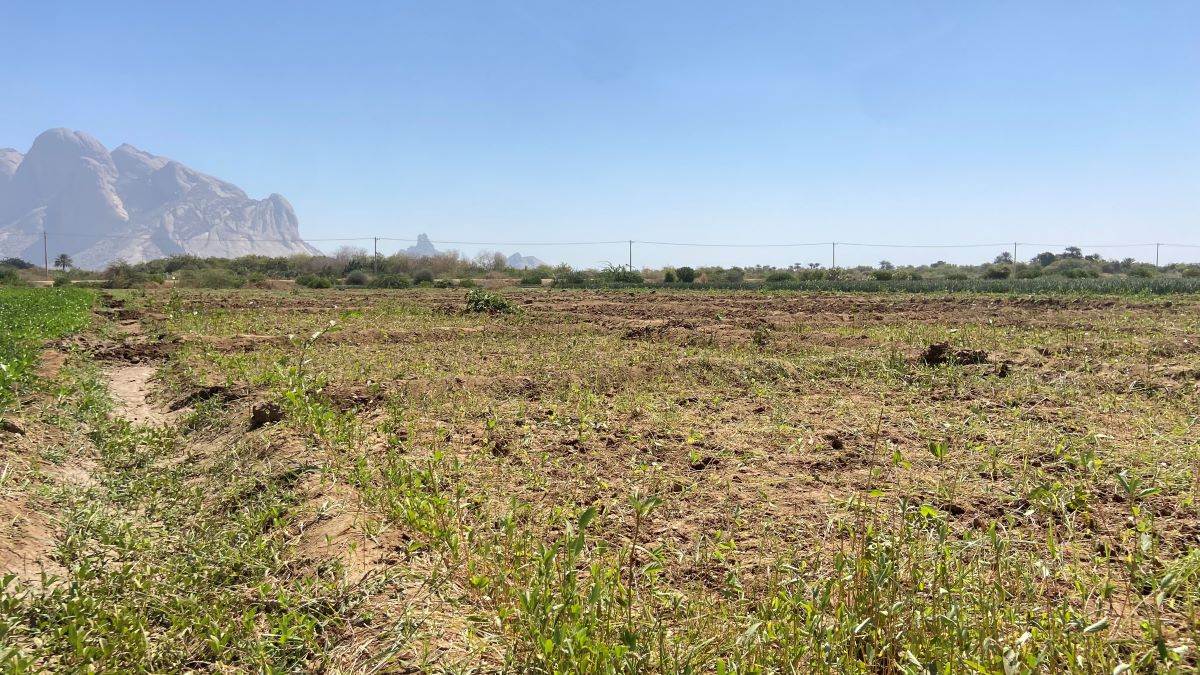As the conflict continues in Sudan, harshly disrupting agricultural extension communication and research linkages, Suliman Gadalla, a 55-year-old farmer from Shagarab West Village in Khasum Algrba Locality, Kassala State, eastern Sudan, feels proud that farmers in his village are eagerly asking him about the new sorghum variety he is growing on his farm. Gadalla is very satisfied with his experience using a chisel plough, growing certified seeds, and applying chemicals to control herbicides.
“Every day, no fewer than 10 farmers visit my field to gain firsthand experience in using proper agricultural technologies and to learn more about the new sorghum varieties I am growing,” said Gadalla.
“When I learned about the new sorghum varieties grown on Suliman’s farm and saw their good growth, I told myself I must follow what he is doing to understand the benefits of the new planting methods and wait until harvest to see the yield of the new varieties. If the trial is successful, I plan to get some seeds from my friend Suliman, either by purchasing or borrowing, and cultivate the new varieties next season on my farm,” said Hassan Rahamtalla, a 57-year-old farmer in West Shagarab Village in Khashum.
Under the aegis of the SASAS program, the USAID-funded SFSI was launched in May 2024 in response to Sudan’s food security challenges. SASAS partners strive to increase crop yields through the adoption of certified seeds and Quality Declared (QD) seeds of improved crop varieties.
Through farmers’ demonstration fields, SASAS partners CIMMYT and Harvest Investment Company LTD work extensively to accelerate the adoption of two newly released sorghum varieties, Butana and Dahab, and make their seeds available to communities through demonstration farms established in over ten villages across four localities in Kassala State.

“In addition to inclusive agricultural advisory services, one expected outcome of the demonstration fields is to provide high-quality seeds of the new sorghum varieties, which will increase variety options for farmers and enhance seed system security through improved seed availability,” said Omar Ali, SASAS Seeds Systems Officer.
SASAS partners fully supported the cultivation of 60 feddans in Kassala State as demonstration farms to provide agricultural advisory services that deliver critical information on improved crops, soil, and water management to rural communities through extension, demonstration campaigns, and market linkages.
“The knowledge and skills I gained from the on-farm training are amazing. We were given real experience in ploughing our lands using a chisel and disk harrow and learned how to treat our seeds against fungal diseases and insect pests,” said Hawa Adam, a 45-year-old female farmer from New Halfa, adding that learning how to use herbicides to control weeds was very useful.
“Support from SASAS came at a critical time as the armed conflict spread into new areas across the country, reducing the areas allocated for improved seed production. Through the SFSI farmers’ demonstration fields, we are exposing farmers to new varieties and enabling them to produce high-quality seeds of these varieties so that we ensure seed availability for the next farming season,” said SASAS Program Chief of Party Abdelrahman Kheir.
Agricultural research in Sudan has shown that certified seeds sourced from foundation seeds increase the yield of sorghum by at least 40% compared to seeds obtained from farmers’ bags. Seed multiplication of sorghum under the proposed area (450 feddans) will produce a quantity of certified seeds with the potential to plant a significant area of sorghum for food and feed in the 2025 growing season.



 Climate adaptation and mitigation
Climate adaptation and mitigation 
